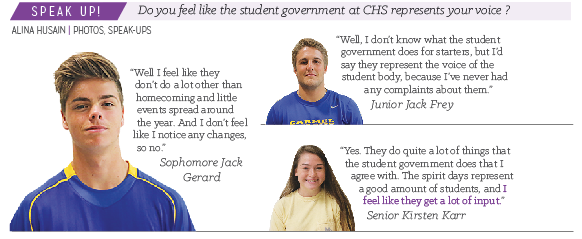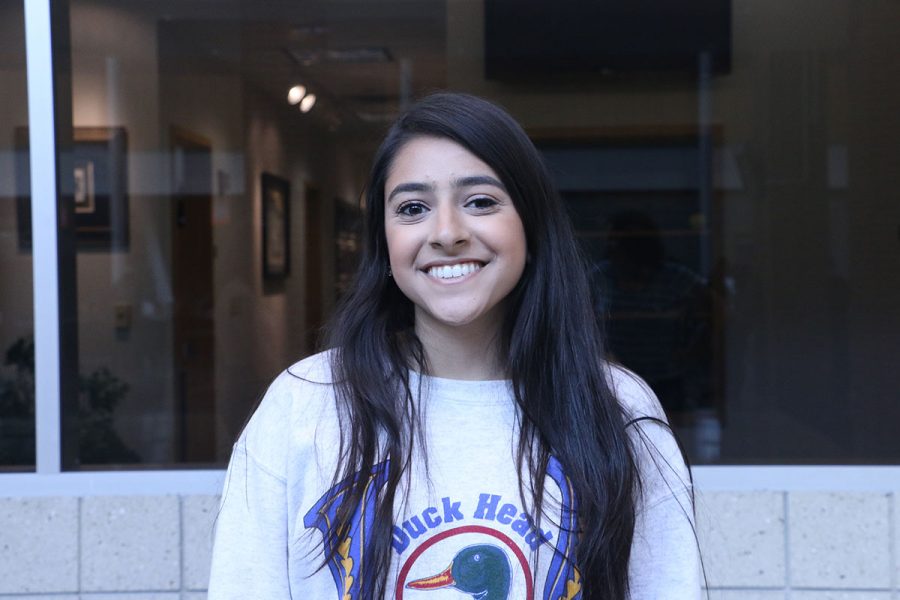With a population of over 5,000 students, CHS is one of the largest high schools in the nation, and in a sea of so many students, it is frighteningly easy for faces to be forgotten and voices to be lost. So, in an abyss of thousands of students, how is anyone meant to voice their concerns and be heard? In many schools, that’s where student government is supposed to step in.
Here at CHS we have no lack of student government organizations; added together Senate, Cabinet, class officers and our House of Representatives, this school has a student leader population larger than some high schools in their entirety. Our problem, therefore, is not that we have a lack of student leaders, but it is that our student leaders have few forums through which they can receive student concerns. The main role of has become planning events like fundraisers throughout the year, which are certainly important to CHS. However, planning those events eclipses listening to fellow students and identifying problems within the school.
To be fair, it’s not our student leaders’ fault. I have no doubt those students work tirelessly for the student body. Rather, the reality is even if they wanted to make changes, our student leaders lack the authority to do so. This systemic problem must be addressed from an administrative level.
Certainly administrators have the students’ best interests in mind, but ultimately we are the ones who come to school every day and sit in classrooms from 7:50 a.m. to 3:05 p.m., and yet we have the least say in how our school runs. Administrators here and at the district level often forget students know the school better than most anyone else, and they can be one of the most valuable resources for constructive criticism.
To be fair, we do have groups like the Principal’s Advisory Council, which meets regularly with Principal John Williams to discuss issues within CHS; however, the average student has no clear way of bringing any issues they have with the school to light other than walking up to Principal Williams and asking him. While I imagine there are some students who would gladly do this, I believe most students might be unwilling to walk up to an administrator and criticize CHS.
Our student leaders are in a position to be at the forefront of this correction to manage a forum for student questions, whether through a school-wide comment box or even an online option. But those leaders should have the power to make changes within CHS.
To be clear, the student government and administrators at CHS are great at their jobs. CHS should be proud of what both groups have accomplished. But, as Principal Williams likes to say, if you don’t strive to get better, you’re going to get worse. Providing clear avenues for all students to provide feedback and voice concerns is one way to continue to improve CHS.





























![Keep the New Gloves: Fighter Safety Is Non-Negotiable [opinion]](https://hilite.org/wp-content/uploads/2024/12/ufcglovescolumncover-1200x471.png)















































![Review: “Family By Choice” is the perfect watch that encapsulates family, love and everything in between [MUSE]](https://hilite.org/wp-content/uploads/2024/12/family-by-choice-1.png)
![Review: “A Phở Love Story” is an exceptional and authentic representation of teenage Vietnamese-Americans [MUSE]](https://hilite.org/wp-content/uploads/2024/12/a-pho-love-story-9781534441941_hr-786x1200.jpg)
![Review: “And the War Came” by Shakey Graves is the perfect year-round album [MUSE]](https://hilite.org/wp-content/uploads/2024/12/IMG_2665.jpeg)
![Review: "Abbott Elementary", a show I can watch with my family and truly enjoy [MUSE]](https://hilite.org/wp-content/uploads/2024/12/unnamed-1.png)
![Review: “We Live in Time” leaves you wanting more [MUSE]](https://hilite.org/wp-content/uploads/2024/12/IMG_6358.jpg)
![Review in Print: Maripaz Villar brings a delightfully unique style to the world of WEBTOON [MUSE]](https://hilite.org/wp-content/uploads/2023/12/maripazcover-1200x960.jpg)
![Review: “The Sword of Kaigen” is a masterpiece [MUSE]](https://hilite.org/wp-content/uploads/2023/11/Screenshot-2023-11-26-201051.png)
![Review: Gateron Oil Kings, great linear switches, okay price [MUSE]](https://hilite.org/wp-content/uploads/2023/11/Screenshot-2023-11-26-200553.png)
![Review: “A Haunting in Venice” is a significant improvement from other Agatha Christie adaptations [MUSE]](https://hilite.org/wp-content/uploads/2023/11/e7ee2938a6d422669771bce6d8088521.jpg)
![Review: A Thanksgiving story from elementary school, still just as interesting [MUSE]](https://hilite.org/wp-content/uploads/2023/11/Screenshot-2023-11-26-195514-987x1200.png)
![Review: "When I Fly Towards You", cute, uplifting youth drama [MUSE]](https://hilite.org/wp-content/uploads/2023/09/When-I-Fly-Towards-You-Chinese-drama.png)
![Postcards from Muse: Hawaii Travel Diary [MUSE]](https://hilite.org/wp-content/uploads/2023/09/My-project-1-1200x1200.jpg)
![Review: "Ladybug & Cat Noir: The Movie," departure from original show [MUSE]](https://hilite.org/wp-content/uploads/2023/09/Ladybug__Cat_Noir_-_The_Movie_poster.jpg)
![Review in Print: "Hidden Love" is the cute, uplifting drama everyone needs [MUSE]](https://hilite.org/wp-content/uploads/2023/09/hiddenlovecover-e1693597208225-1030x1200.png)
![Review in Print: "Heartstopper" is the heartwarming queer romance we all need [MUSE]](https://hilite.org/wp-content/uploads/2023/08/museheartstoppercover-1200x654.png)




